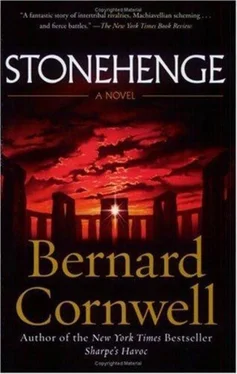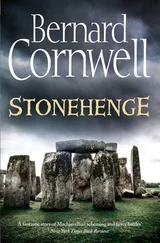The families all lived in the southern part of the enclosure, while in the north were the huts of the potters and carpenters, the forge of the tribe's one smith and the pits of the leather workers. There was still space inside the bank where herds of cattle and pigs could be sheltered if an enemy threatened, and at those times the people would throng to the two temples built inside the earthen ring. Both shrines were rings of timber poles. The largest had five rings and was a temple to Lahanna, the goddess of the moon, while the smaller, with just three rings, was for Arryn, the god of the valley, and for Mai, his wife, who was goddess of the river. The highest poles of those temples stretched three times the height of Galeth, who was the tribe's tallest man, but they were dwarfed by the third temple which lay just to the south of the encircling embankment. That third temple had six rings of timber, and two of the rings had wooden lintels spanning their posts' tops, and that temple belonged to Slaol, the sun god. The Sun Temple had been deliberately built outside the settlement for Slaol and Lahanna were rivals and their temples had to be separated so that a sacrifice at one could not be seen from the other.
Slaol, Lahanna, Arryn and Mai were the chief deities of Ratharryn, but the people knew there were a thousand other gods in the valley, and as many again in the hills, and countless more beyond the hills, and a myriad in the winds. No tribe could build temples for each of the gods, nor even know who they all were, and besides that multitude of unknown gods there were the spirits of the dead, spirits of animals, spirits of streams, spirits of trees, spirits of fire, spirits of the air, spirits of everything that crept and breathed and killed or grew. And if a man was silent, standing on a hill in the evening quiet, he could sometimes hear the murmuring of the spirits, and that murmur could make a man mad unless he constantly prayed at the shrines.
Then there was a fourth shrine, the Old Temple, that lay on the southern hill where it was overgrown with hazel and choked with weeds. That temple had been dedicated to Slaol, but years before, no one could remember when, the tribe had built Slaol the new temple close to the settlement and the old shrine had been abandoned. It had just decayed, yet it must still possess power, for it was there that the gold of the Outfolk had come. Now, on the morning after the great storm, Galeth took three men to the ancient temple to find and bury the Outlander's body. The four men were accompanied by Neel, the youngest of Ratharryn's priests, who went to protect them from the dead stranger's spirit.
The group stopped at the brow of the hill and made a bow to the grave mounds that stood between the Old Temple and the settlement. Neel howled like a dog to attract the attention of the ancestors' spirits, then told those spirits what errand brought the men to the high ground. Galeth, while Neel chanted his news to the dead, stared at the sacred way that ran straight as an arrow's flight off to the west. The ancestors had built that path but, like the Old Temple, it was now overgrown and abandoned, and not even the priests could say why its long straight ditches and banks had been scratched from the earth. Hirac thought it had been made to placate Rannos, the god of thunder, but he did not really know nor did he care. Now, as Galeth leaned on his spear and waited for Neel to detect an omen, it seemed to him that the world was wrong. It was decaying, just as the ancient sacred path and the Old Temple were decaying. Just as Ratharryn was decaying under the siege of sad harvests and persistent sickness. There was a tiredness in the air, as though the gods had become weary of their endless circling of the green world, and that tiredness frightened Galeth.
'We can go,' Neel declared, though none of the men accompanying him had seen what sign the young priest had detected in the landscape. Perhaps it was the brush of a mist tendril against a tree bough, or the banking flight of a hawk, or the twitch of a hare in the long grass, but Neel was confident that the ancestral spirits had given their approval. So the small party walked on into a small valley and up the further slope to the Old Temple.
Neel led the way through the rotted posts on the causeway and into the hazels. The young priest, his deerskin tunic soaked from the wet leaves, stopped with surprise when he reached the old death house. He frowned and hissed, then touched his groin to avert evil. It was not the stranger's body that caused that precaution, but rather because the space in the shrine's centre had been deliberately cleared of weeds and hazel. It looked as though someone worshipped here in secret, though the presence of the ox-skull suggested that whoever came to this forgotten place prayed to Slaol for the ox was Slaol's beast, just as the badger and the bat and the owl belonged to Lahanna.
Galeth also touched his groin, but he was warding off the spirit of the dead stranger who lay on his back with the three arrows still protruding from his chest. Neel dropped onto all fours and barked like a dog to drive the dead man's spirit far from the cold flesh. He barked and howled for a long time, then suddenly stood, brushed his hands and said the corpse was now safe. 'Strip him,' Galeth told his men, 'and dig a grave for him in the ditch.' The stranger would be given no ceremony in his death, since he was not of Ratharryn. He was a mere Outlander. No one would dance for him and no one would sing for him, for his ancestors were not Ratharryn's ancestors.
Galeth, despite his huge strength, found it hard to free the arrows for the stranger's cold flesh had tightened on the wooden shafts, but the shafts did at last come loose, though their flint heads stayed inside the corpse as they were supposed to do. All the tribes tied their arrow-heads loosely so that an animal or an enemy could not pull out the barbed flint which, instead, would stay in the wound to fester. Galeth tossed the three shafts away, then stripped the body naked, leaving only the flat piece of stone that was tied to the dead man's wrist. Neel feared that the stone, which was beautifully polished, was a magical amulet that could infect Ratharryn with a dark spirit from the Outfolk's nightmares, and though Galeth insisted that it had merely protected the man's wrist from his bowstring's lash, the young priest would not be persuaded. He touched his groin to avert evil, then spat on the stone. 'Bury it!'
Galeth's men used antler picks and ox shoulder-blade shovels to deepen the ditch beside the temple's entrance to the sun, then Galeth dragged the naked body through the hazels and dumped it in the shallow hole. The stranger's remaining arrows were broken and tossed in beside him, and then the spoil was kicked over the body and trampled flat. Neel urinated on the grave, mumbled a curse on the dead man's spirit, then turned back into the temple.
'Aren't we finished?' Galeth asked.
The young priest raised a hand to demand silence. He was creeping through the hazels, knees bent, stopping every other pace to listen, just as though he were stalking some large beast. Galeth let him go, presuming that Neel was making certain the stranger's spirit was not clinging to the temple, but then there was a rush of feet, a yelp and a piteous howl from deep within the hazels and Galeth ran into the shrine's centre to find Neel holding a struggling creature by the ear. The priest's captive was a dirty youth with wild black hair that hung matted over a filthy face, so filthy that he seemed as much beast as human. The youth, who was skeletally thin, was beating at Neel's legs and squealing like a pig while Neel flailed wildly in an attempt to silence him.
'Let him go,' Galeth ordered.
'Hirac wants him,' Neel said, at last succeeding in landing a stinging blow on the youth's face. 'And I want to know why he's been hiding here! I smelt him. Filthy beast,' he spat at the boy, then clouted him again. 'I knew someone had been interfering here,' Neel went on triumphantly, gesturing with his free hand at the carefully cleared space where the ox-skull sat, 'and it's this dirty little wretch!' The last word turned into an agonized scream as the priest suddenly let go of the boy's ear and doubled over in pain, and Galeth saw that the boy had reached under Neel's bone-fringed tunic to squeeze his groin, and then, like a fox cub unexpectedly released from a hound's jaws, dropped to all fours and scrambled into the hazels.
Читать дальше
Конец ознакомительного отрывка
Купить книгу












